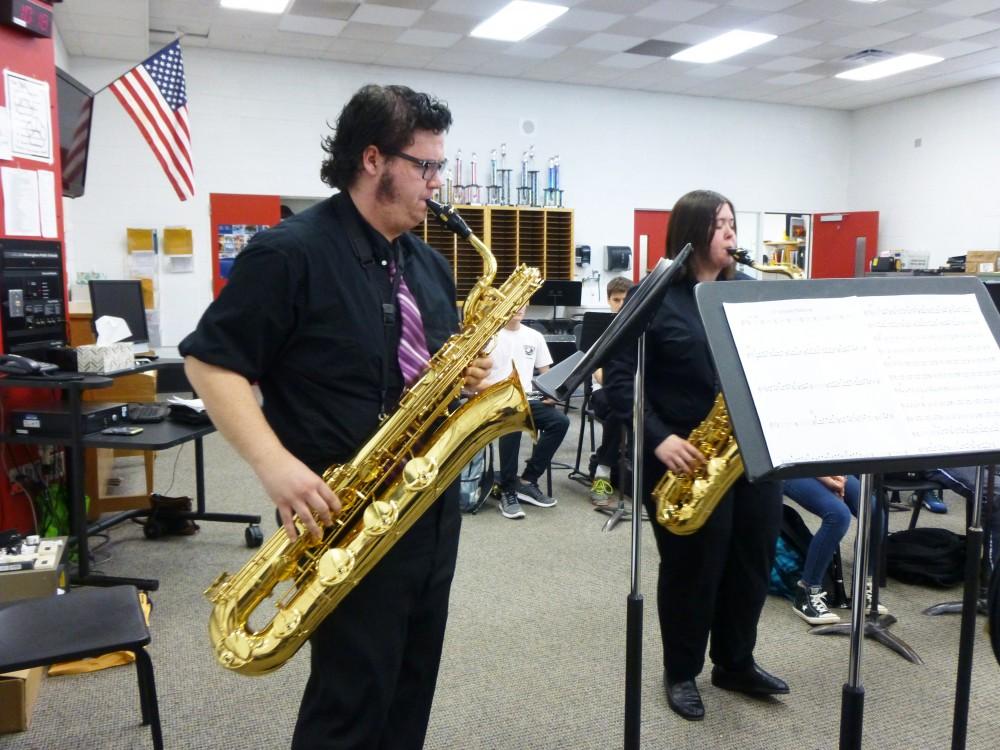GV Saxophone studio spreads their love of music

GVL / Claire Fisher – The Yavin IV Saxophone Quartet perform at Eerkshire Middle School in Beverly Hills, MI on May 3, 2016.
May 9, 2016
Traveling around the state, performing for young music students and answering some outrageous questions, the saxophone studio at Grand Valley State University is continuing their work this summer with an outreach tour for elementary school, middle school and high school band programs.
“A lot of this tour is just making (the students’) time in band seem more valuable and anything we can do to help them enjoy music will by extension help them enjoy learning it,” said senior saxophone student Karsten Wimbush. “And that’s what we want to do, we want to be able to inspire students.”
Reaching approximately 2,400 students with 20 performances, the three quartets that make up the saxophone studio at GVSU (Yavin IV, GQ and Jubilee) will play for students, work with sections of the band and answer any questions the students might have.
The tour will bring music to band students and also culminate what the saxophone studio has been working on this school year.
“The tour brings together all the different aspects of what we’re studying,” Wimbush said. “It brings together the performance aspect of things, the teaching aspect of things, the classroom management portion of it, getting exposure to students. We get exposure not only for our performance skills, but also being advocates for music.”
Wimbush, a member of Jubilee, said his quartet worked to set the program for the performances by trying to make the music exciting, valuable and accessible for students. To demonstrate the importance of scales and arpeggios, Wimbush said his quartet played a piece which heavily relied on these.
“(Scales and arpeggios) are things that normally students in high school and middle school just hate,” Wimbush said. “We hate doing those exercises every day and having to memorize them. Yet in this music, we can demonstrate the piece both with and without the scales and arpeggios. And when we take away those really intense and rapid fire scales and arpeggios, all of the sudden the piece just loses all of its power. So it shows that, yeah, those are annoying, but they make the music so much easier to enjoy.”
Outside of scales, the quartets have been bringing a little bit of whimsy to their performances by playing Disney and “Star Wars” medleys.
“We get a lot of requests for ‘Careless Whisper’ and ‘Thrift Shop’ and pop tunes, but we also added a medley of different Disney tunes that we didn’t play during the year, just because we thought it would be fun,” Wimbush said. “When we went to work with the sixth graders, they sang along the entire time. They thought that was great. It was a lot of fun.”
Dan Graser, assistant professor of saxophone, said for the outreach tour the students in the saxophone studio had to contact band directors, schedule the performances at the schools and set the programs themselves. He hopes this volunteerism will show the younger students the enthusiasm GVSU students have for music.
“When a student gets to see somebody who is only a couple of years older than them, who gave a really good performance and can talk with them very directly about what college and music major life is like, it’s a very beneficial experience for everyone involved,” Graser said. “These are all things that professors do anyway, but having students involved is even more beneficial in my view because they represent what these kids are hoping to be in a couple of years.”
In order to prepare for the outreach tour, the saxophone studio practiced with their quartets and worked with Graser on the music as well as how to interact with students.
“We practiced about three hours a week on our own time and then on top of that we have a one hour a week coaching with our professor where we bring him what we’ve been working on and he’ll help us out and try to fix some problems with it,” said saxophone student Melissa Campbell.
The outreach tour recently received a grant from the music and dance department at GVSU to help them with their travel costs as they go out and represent the program. Campbell said she hopes the students they perform for enjoy the music and also grow an interest in continuing in music.
“We want to get the students to stay in music,” Campbell said. “That is the ultimate goal. A lot of us are music majors and we want to perform or teach music one day, so the more students we can encourage to stay involved in music, whether it’s their primary focus or secondary focus, the better.”

























